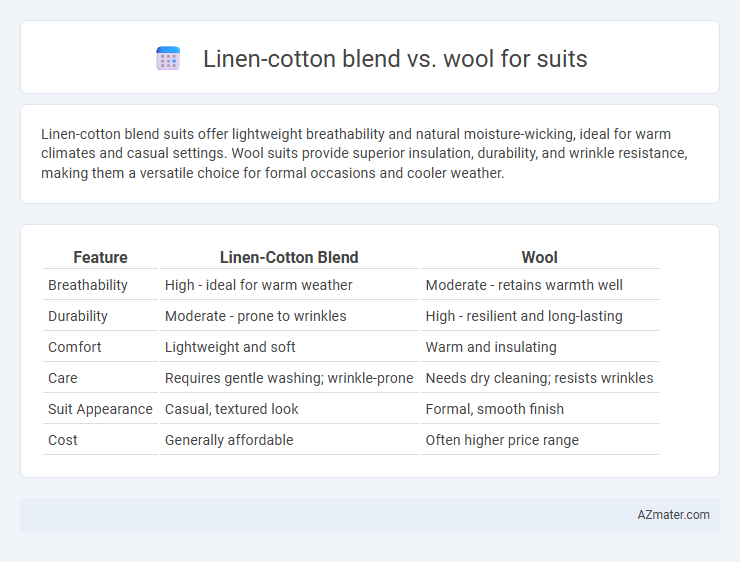Linen-cotton blend suits offer lightweight breathability and natural moisture-wicking, ideal for warm climates and casual settings. Wool suits provide superior insulation, durability, and wrinkle resistance, making them a versatile choice for formal occasions and cooler weather.
Table of Comparison
| Feature | Linen-Cotton Blend | Wool |
|---|---|---|
| Breathability | High - ideal for warm weather | Moderate - retains warmth well |
| Durability | Moderate - prone to wrinkles | High - resilient and long-lasting |
| Comfort | Lightweight and soft | Warm and insulating |
| Care | Requires gentle washing; wrinkle-prone | Needs dry cleaning; resists wrinkles |
| Suit Appearance | Casual, textured look | Formal, smooth finish |
| Cost | Generally affordable | Often higher price range |
Introduction to Suit Fabrics: Linen-Cotton Blend vs Wool
Linen-cotton blend suits offer lightweight breathability and natural moisture-wicking properties, ideal for warm-weather wear. Wool suits provide superior insulation, durability, and wrinkle resistance, making them versatile for year-round and formal occasions. Choice between these fabrics depends on climate, comfort preferences, and occasion formality.
Key Characteristics of Linen-Cotton Blend
Linen-cotton blend fabrics for suits combine the breathability and lightweight nature of linen with the softness and durability of cotton, making them ideal for warm weather and casual to semi-formal occasions. This blend offers excellent moisture-wicking properties and a natural texture that resists wrinkles better than pure linen, while maintaining a cool, comfortable feel. Compared to wool, linen-cotton suits provide superior ventilation and a more relaxed drape, but may lack the insulation and formality typically associated with wool suits.
Key Characteristics of Wool Suits
Wool suits are renowned for their natural insulation, moisture-wicking properties, and durability, making them ideal for year-round wear and maintaining shape over time. The fabric offers excellent breathability while providing warmth in cooler climates, featuring wrinkle resistance that keeps the suit looking sharp throughout the day. High-quality wool fibers, such as merino, contribute to a soft texture and luxurious feel, setting wool apart from linen-cotton blends in terms of elegance and longevity.
Breathability and Comfort Comparison
Linen-cotton blend suits offer superior breathability and moisture-wicking properties, making them ideal for warm climates and extended wear in hot conditions. Wool suits provide excellent temperature regulation and natural elasticity, enhancing comfort by adapting to varying temperatures and maintaining durability. While linen-cotton blends excel in lightweight, airy comfort, wool remains preferred for its softness, resilience, and year-round versatility.
Durability and Longevity: Which Lasts Longer?
Linen-cotton blend suits offer breathability and a lightweight feel but tend to wrinkle easily and show wear faster, making them less durable over time compared to wool. Wool suits, especially those made from high-quality merino fibers, provide superior resilience, maintaining their shape and appearance through regular use and multiple seasons. Wool's natural elasticity and moisture-wicking properties contribute to enhanced longevity, making it the preferred fabric for durable, long-lasting suits.
Suit Maintenance: Care and Cleaning Differences
Linen-cotton blend suits require gentle washing or dry cleaning and frequent airing to prevent wrinkles and maintain breathability, with spot cleaning recommended for minor stains. Wool suits demand careful dry cleaning, ideally only a few times per season, as over-cleaning can damage fibers, and should be brushed regularly to remove dirt and restore the nap. Proper storage with cedar hangers ensures both fabrics retain shape and freshness, but wool benefits more from humidity control to prevent moth damage.
Style and Appearance: Texture, Drape, and Color
Linen-cotton blends offer a lightweight texture with a natural, slightly crisp feel and a relaxed drape that emphasizes breathability and casual elegance, often showcasing a matte finish with soft, muted colors ideal for warm-weather suits. Wool provides a smoother, more refined texture with a structured drape that maintains sharp lines and a polished appearance, available in a wide range of rich, deep colors that enhance the suit's formality and versatility. The contrast in texture and drape between linen-cotton blends and wool significantly influences the suit's overall style, with linen-cotton suits exuding an effortless, casual charm, while wool suits present a classic, tailored sophistication.
Weather Suitability: Seasonal Considerations
Linen-cotton blends excel in warm weather due to their breathable and lightweight fibers, making them ideal for spring and summer suits. Wool offers superior insulation and moisture-wicking properties, providing comfort and durability in cooler fall and winter conditions. Choosing between the two depends on seasonal temperature variations and the need for temperature regulation in formal wear.
Price and Value: Linen-Cotton Blend vs Wool
Linen-cotton blend suits generally offer a more affordable price point compared to wool suits, making them a budget-friendly option for warm-weather wear. Wool suits provide higher durability and better wrinkle resistance, offering greater long-term value despite a higher initial cost. The choice between linen-cotton blend and wool hinges on balancing upfront affordability with the enhanced lifespan and premium feel wool delivers.
Choosing the Right Fabric: Suiting Up for Your Needs
Linen-cotton blend suits offer lightweight breathability and natural moisture-wicking properties, ideal for warm climates and casual occasions. Wool suits provide superior insulation, durability, and wrinkle resistance, making them suitable for formal settings and cooler weather. Selecting the right fabric depends on factors like climate, event formality, and personal comfort preferences to achieve optimal style and functionality.

Infographic: Linen-cotton blend vs Wool for Suit
 azmater.com
azmater.com